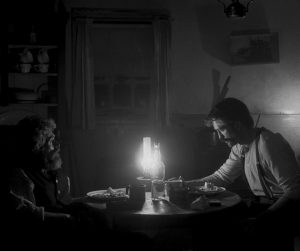 The Lighthouse (Perth Film Festival) ★★★★
The Lighthouse (Perth Film Festival) ★★★★
NOT since Darren Aronofsky’s Mother! in 2017 have we had such an intense, ambitious and nightmarish cinematic experience as The Lighthouse.
New York based director Robert Eggers combines a dense script in both language and content, full of references to classical maritime literature and ancient mythology, with a singular visual commitment and searing music score and soundscape to portray the descent of his characters into the depths of madness.
And Eggers’ words are superbly delivered by two of the most consistently interesting actors working today – Willem Dafoe and Robert Pattinson.
The film was shot on 35mm monochrome film and is presented in a traditional (almost square) aspect ratio to frame the time period within which it occurs and the remoteness of the location as well as emphasising the isolation and claustrophobia that impacts the two characters.
Separated for half of each day, only to be forced together for an intensive few hours in a physically constrictive setting, the men slowly bond and ferociously clash through frustration, fear, ego, distrust and boredom, all fuelled by mounting alcohol abuse bringing them to the brink of psychological breakdown.
As with his strong debut horror film The Witch in 2015, Eggers isn’t content to just challenge and disturb.
He demands the audience work hard to understand and appreciate The Lighthouse, both in the style of language used and the visual presentation.
Eggers gives us the opportunity to immerse ourselves in the detail, deconstruct his vision and create an individual experience.
The Lighthouse of the title, constructed for the film, is located on a remote islet off the foreboding coast of New England. It’s the late 19th Century.
We follow two men as they arrive to take over the physically and mentally demanding roles of tending the lighthouse and associated camp. It’s a stark and unforgiving environment in any weather.
The elder man is the lighthouse keeper and senior of the two. The younger man is his ‘wickie’, a form of indentured apprentice who is relegated to the worst and mundane, but necessary, chores.
Slowly the younger man comes to realise the bizarre extent of the lighthouse keeper’s obsession with his role and disdain for anyone he believes is seeking to usurp his authority.
Amidst the threat of maritime omens, frustration of back-breaking work and approaching storm conditions, the younger man succumbs to alcohol abuse and resulting visions that defy reason, including the appearance of a sensuous mermaid, while the lighthouse keeper sinks deeper into his psychosis and distrust.
Blood, excrement, urine, guts, offal, vomit and semen litter the screen at various moments along the journey as the viewer is led through this turmoil to the shattering and inevitable, but still surprising, conclusion.
This is not a film for general audiences and many will switch off part way, refusing to be interested in, let alone consumed by, Egger’s nightmare.
But others will choose to immerse themselves in the sights and sounds in admiration of the technical skill, beautiful language, intense acting and innovative approach.
It’s a difficult but mesmerising and rewarding experience.